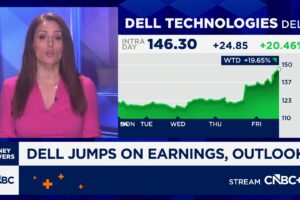We recently compiled a list of the 10 Best ESG Stocks To Buy Now. In this article, we are going to take a look at where Microsoft Corporation (NASDAQ:MSFT) stands against the other ESG stocks.
Defining ESG can sometimes be straightforward: it’s a finance and investing approach centered on managing risks related to environmental factors, social issues, and corporate governance. Although the concept emerged about two decades ago through a collaboration between United Nations officials and the finance industry, who argued that addressing ESG risks like climate change, labor disputes, and poor corporate governance can safeguard investments, it wasn’t until the late 2010s and into the 2020s that ESG evolved into a more proactive movement, rather than a reactive one.
A report from the World Meteorological Organization (WMO) confirmed that 2023 was the warmest year on record, with the global average near-surface temperature reaching 1.45°C—closer than ever to the 1.5°C lower limit set by the Paris Agreement on climate change. Another report from the United Nations’ Intergovernmental Panel on Climate Change (IPCC) also reveals that climate-driven disasters are already surpassing scientists’ initial predictions. This urgency has sparked increased interest in niche yet rapidly expanding sectors of ESG investing, such as climate-transition funds and catastrophe bonds. In 2024, global investment in clean energy is expected to hit a significant milestone, doubling the amount allocated to fossil fuels. The International Energy Agency’s (IEA) 2024 World Energy Investment report forecasts that total global energy investment will surpass $3 trillion this year, with $2 trillion directed toward clean technologies like renewables, electric vehicles, and nuclear power. Furthermore, Bloomberg reports that global investment in the energy transition surged by 17% last year, reaching a record $1.8 trillion, with this growth trend continuing. Former VettaFi financial futurist Dave Nadig said:
“If you solely look at climate as your window, you’ll probably not end up not owning a lot of energy companies, not owning a lot of miners [and] not owning a lot of steel companies. So, you end up with something that looks like services, healthcare, and technology, which is a very strong bet to take.”
That said, U.S. funds with ESG goals seem to be losing popularity as of late. Despite the broader stock market’s gains, assets in the sector have dropped to around $335 billion, down from a peak near $365 billion at the end of 2021. Political criticism of ESG in the country has also has led some investors to reconsider their strategies within the sector. Moreover, ESG stocks are also grappling with other significant challenges, such as a key climate regulation from the U.S. Securities and Exchange Commission that is currently under legal dispute, and the Federal Reserve’s resistance to including environmental risks in global financial regulations.
However, despite criticism labeling the ESG sector as “woke” investing, many U.S. firms remain dedicated to ESG initiatives. Investor interest also remains somewhat robust, as these funds continue to attract attention for considering both financial performance and environmental, social, and governance factors. While there have been big outflows from the sector, many institutional investors are approaching climate risks and opportunities in their portfolios with a heightened sense of urgency, with an August analysis published in the Harvard Business Review showing that nearly three-quarters of the corporate climate commitments announced in 2021 had been fully or partially achieved. JPMorgan Chase & Co. and Citigroup Inc. are among the top global underwriters of green bonds this year, while Bank of America, alongside other prominent investment banking firms, recently sponsored ESG-focused conferences in New York and Chicago.
With that in mind, ESG funds saw strong performance in the first half of the year, largely driven by their substantial investments in technology stocks. Most ESG funds that aren’t focused on renewable energy tend to allocate more to tech stocks while maintaining a lower exposure to oil and gas stocks. In the first six months of the year, the S&P 500 rose by approximately 15%, and nearly 60% of this gain was driven by the majority of the ‘Magnificent Seven’, which are often among the largest holdings in ESG funds.
Our Methodology
To create the list of top ESG stocks to buy now, we chose companies from the Vanguard ESG U.S. Stock ETF and ranked them by their percentage weight in the fund, listed in ascending order. In addition, we used hedge fund sentiments regarding each stock to illustrate how well these stocks hold up in the eyes of hedge fund investors. These were taken from Insider Monkey’s Q2 2024 database.
At Insider Monkey we are obsessed with the stocks that hedge funds pile into. The reason is simple: our research has shown that we can outperform the market by imitating the top stock picks of the best hedge funds. Our quarterly newsletter’s strategy selects 14 small-cap and large-cap stocks every quarter and has returned 275% since May 2014, beating its benchmark by 150 percentage points (see more details here).

A development team working together to create the next version of Windows.
Microsoft Corporation (NASDAQ:MSFT)
Percentage of holdings in the fund: 6.79%
Number of Hedge Fund Holders: 279
Microsoft Corporation (NASDAQ:MSFT) stands out as a leading ESG stock, much in part due to its strategic investment in OpenAI, the creator of ChatGPT, which has strengthened its position across hardware, software, and global cloud services. The company is committed to sourcing 100% renewable energy by 2025, becoming carbon negative by 2030, and offsetting all historical carbon emissions since its founding in 1975 by 2050.
Microsoft Corporation (NASDAQ:MSFT) shares recently dipped after the company’s latest quarterly results revealed slower-than-expected growth in its Cloud business. For the current quarter, Microsoft Corporation (NASDAQ:MSFT) projects revenue between $63.8 billion and $64.8 billion, slightly below the $65.07 billion estimate, with Azure revenue anticipated to grow by 28% to 29% year over year. Additionally, the company’s Office commercial customer sales surged to $48 billion, marking a significant increase from last year’s 10% growth, likely fueled by the adoption of Copilot Pro subscriptions.
BMO Capital Markets maintained its positive outlook on Microsoft Corporation (NASDAQ:MSFT), keeping an Outperform rating and a $500 price target. The firm emphasized Microsoft Corporation (NASDAQ:MSFT)’s strong position in artificial intelligence and its diverse product portfolio as key reasons for its top pick status. Although BMO acknowledged a less-than-stellar June quarter report and guidance for about 29% year-over-year growth in Azure for the September quarter, Microsoft’s management projected an acceleration in Azure growth in the second half of fiscal 2025 during the last earnings call. BMO’s analysis suggests that while Azure’s growth has been limited by capacity constraints in recent quarters, these challenges are expected to ease in the latter half of FY25, supported by a strong demand pipeline.
Polen Focus Growth Strategy stated the following regarding Microsoft Corporation (NASDAQ:MSFT) in its Q2 2024 investor letter:
“The top absolute contributors were Alphabet, Microsoft Corporation (NASDAQ:MSFT), and Amazon. Microsoft was another top absolute contributor in the quarter, speaking to a growing appreciation for all the ways the company has an opportunity to monetize GenAI, be it in its Office suite or Azure cloud business. In the latter case, it contributed 7% to Azure’s revenue growth in the most recent quarter. We believe Microsoft remains a highly advantaged business with many secular tailwinds driving durable growth for the foreseeable future, even at its immense scale.”
Overall MSFT ranks 2nd on our list of the best ESG stocks to buy. While we acknowledge the potential of MSFT as an investment, our conviction lies in the belief that AI stocks hold greater promise for delivering higher returns, and doing so within a shorter timeframe. If you are looking for an AI stock that is more promising than MSFT but that trades at less than 5 times its earnings, check out our report about the cheapest AI stock.
READ NEXT: $30 Trillion Opportunity: 15 Best Humanoid Robot Stocks to Buy According to Morgan Stanley and Jim Cramer Says NVIDIA ‘Has Become A Wasteland’.
Disclosure: None. This article is originally published at Insider Monkey.









